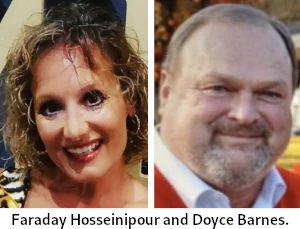Faraday Hosseinipour & Doyce Barnes appeal conviction
 Faraday Hosseinipour and Doyce Barnes have filed appeals against their Infinity2Global conviction.
Faraday Hosseinipour and Doyce Barnes have filed appeals against their Infinity2Global conviction.
A jury convicted both scammers in September 2022. Barnes was subsequently sentenced to 4 years in prison in December 2022. Hosseinipour was sentenced to 2.5 years in July 2023.
 While their appeal plays out, Hosseinipour and Barnes filed a motion requesting release from prison. The DOJ opposed the motion.
While their appeal plays out, Hosseinipour and Barnes filed a motion requesting release from prison. The DOJ opposed the motion.
In deciding the request, the Sixth Circuit cited the following legal framework from USC;
“[A] person who has been found guilty of an offense and sentenced to a term of imprisonment, and who has filed an appeal or a petition for a writ of certiorari, [must] be detained, unless” there is “clear and convincing evidence that the person is not likely to flee or pose a danger to the safety of any other person or the community” and the appeal “raises a substantial question of law or fact” that is likely to result in “reversal, . . . an order for a new trial, . . . a sentence that does not include a term of imprisonment, or . . . a reduced sentence.”
Based on prior District Court findings, the Sixth Circuit ruled out Hosseinipour and Barnes being a flight risk or danger to the community.
Accordingly, the only question before us is whether Defendants’ appeals raise a substantial question of law or fact.
The Sixth Circuit ruled the mutual arguments Hosseinipour and Barnes raised in support of release “did not justify release”. Accordingly, Barnes’ motion for release was denied.
Hosseinipour prevailed by throwing her attorney under the bus. This is interesting as Hosseinipour’s chosen attorney is the brother of David Manning, her husband.
One has to assume this was a “go with family” decision, as Hosseinipour’s attorney otherwise
had very little experience with criminal representations or jury trials; no experience with federal prosecutions, criminal proffer
agreements, complex e-discovery, or government investigations; and that he was not even subscribed to a legal research service.
Hosseinipour argues that, back in the District Court, she
sought an evidentiary hearing in the district court for the precise reason of developing the record as to her counselís ineffective assistance.
The aim was to get a new trial, which the District Court denied.
Specific complaints Hosseinipour raised include her attorney
- advising Hosseinipour to reject a plea offer because it would be perjury to plead guilty when she believed she was innocent
- failing to inform Hosseinipour or the government about the otherís expressed interest in additional plea negotiations
- refusing to file a motion to sever when Hosseinipour asked him to, which left her as the only low-level participant tried alongside I2G’s ringleaders
- not reviewing Hosseinipour’s statement to a federal agent until after the agent testified and
- even refusing to inform the court that Hosseinipour had fired him, telling co-defendants’ counsel but continuing to participate in the trial.
The District Court rejected Hosseinipour’s claims on the grounds they were “self-serving”.
Nonetheless, the Sixth Circuit believes the claims raise “a substantial issue”, warranting Hosseinipour’s release pending the outcome of her appeal.
Hosseinipour was subsequently released from prison on October 10th.
Pending the outcome of Hosseinipour’s and Barnes’ filed appeal, we’ll keep you posted.
Update 1st July 2025 – Doyce Barnes’ appeal with respect to his conviction has been denied.
The Sixth Circuit also upheld Faraday Hosseinipour’s conviction, but sent her motion for a new trial back to the District Court to be ruled on again.


Bit hard to not see this as just putting off the inevitable.
There doesn’t appear to be any issue with case against Hosseinipour and Barnes. If a retrial is ordered because of Hosseinipour’s choice of attorney, that just takes things back to square one as far as the trial goes.
While not certain, it’s reasonable to believe the trial will play out in the same manner. The case against Hosseinipour doesn’t change because of her poor choice of attorney.
How does one throw an attorney under a bus, asking for a friend…
Seriously though, is this real reporting? If an appeals court ruled that there is a substantial issue with a case we should be applauding our system for taking every step necessary to ensure no innocent people are in prison.
I believe that these judges have substantially more experience than us normal citizens in regard to what the law is or what would constitute an issue with due process.
By hiring said attorney after you’re criminally charged in 2017, and then only complaining after you’re found guilty in 2022 through a “self-serving” affidavit.
Yeah except that’s not what’s happening here. The appeals court only ordered Hosseinipour’s release on the basis she might have something with her allegedly incompetent lawyer.
This isn’t a question of guilt – the appeals court had no issue with the evidence or trial, hence why Barnes is still locked up.
Outside of the release, Hosseinipour having an incompetent lawyer at best will get her a retrial. Well all know how that’s likely to turn out.
Notwithstanding Maike’s appeals have already been denied.
Hosseinipour is guilty as sin. This is just more “self-serving” stalling.
Also, if she does get a new trial and is convicted again, she can potentially be sentenced to more jail time.
Any update on this?
I’ve been checking the docket periodically. No updates.
The case was argued in front of a Sixth Circuit panel this past December.
I typically don’t follow the appeal dockets. The outcome eventually shows up on the regular case docket once an opinion is filed.